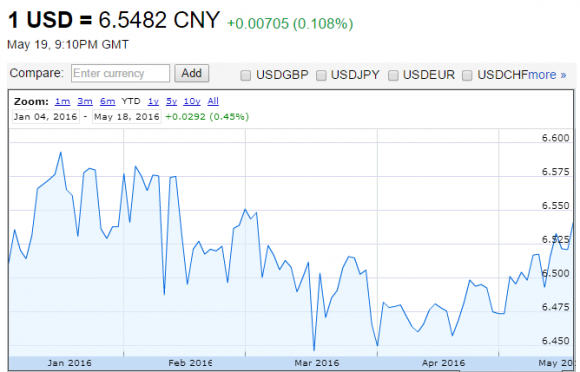Chinese Currency Moves Signals Trouble Ahead
May 20, 2016 1:45 AM ET
By Valentin Schmid
After the market fireworks at the beginning of the year, things started to quiet down at the end of February right after the G20 meeting in China. This quiet period is about to end if we take the Chinese currency as an indicator.
Markets were worried the yuan would crash against the dollar with some hedge fund managers even betting on a 50 percent decline in 2016. China's stock market crashed some 25 percent in January and the S&P 500 lost almost 10 percent at its low point in February.
After the unofficial Shanghai Accords - named after the place of the G20 meeting - this concern receded as the U.S. dollar weakened and emerging market currencies including China's yuan appreciated. The Federal Reserve played a part as it skipped raising interest rates during its first meetings in 2016 and Chinese capital outflows markedly slowed from March onwards.
So the yuan hit a relative high against the dollar in March at 6.45, the S&P 500 made it to green for the year, but it seems this was as good as it gets.
For no apparent reason, the yuan then started to decline and is approaching the January lows of 6.60 per dollar.

At the beginning of May, Australia defected from the rest of the world's central banks by cutting interest rates in an effort to weaken its currency, breaching the agreement to let the dollar weaken across the board.
On May 18, the Federal Reserve released the minutes of its March meeting, indicating it may just raise rates again. This led to a sharp sell-off in the Chinese currency and prompted the People's Bank of China (PBOC) to intervene in the currency markets to strengthen the yuan.
The Chinese economy and possible capital outflows are coming to the forefront of analysts and traders again.
"China's macro [economic picture] may weaken (against the recent consensus of a cyclical upturn) and there is a risk that capital outflows will pick up again," the investment bank Nomura writes in a note to clients.
Ever since the Fed started to tighten global liquidity at the end of 2013, the U.S. dollar has steadily crept higher, conversely pulling the yuan lower. Since 2015, the falling Chinese currency has preceded market turmoil in the fall of last year and at the beginning of this year.
Now all eyes are on the Fed which meets on June 16-17 and is highly likely to raise rates, at least according to best-selling author James Rickards:
"I think in June, particularly after having skipped March, they're going to want to get back on track. They're going to raise rates, but the market expectation is still not better than 50 percent that they will," he said right when the dollar put in a bottom in March.
seekingalpha.com
-------------------------------------------------------
Market Impact of Brexit Is Key Concern for G-7 Finance Chiefs
by Svenja O'Donnell, Josh Wingrove and Rainer Buergin
May 20, 2016 — 1:18 AM EDT
The risk of Britain exiting the European Union is a key concern for Group of Seven finance chiefs amid fears a vote to leave the EU in just over a month could roil international markets.
Finance ministers and central bank governors of G-7 countries meeting in Sendai, Japan, on Friday are discussing the possibility of Brexit as one of the biggest risks on the horizon, according to officials from G-7 members who declined to be identified because the talks were private.
U.K. Prime Minister David Cameron’s decision to hold a referendum on Britain’s membership of the EU on June 23 has split his ruling Conservative Party and drawn warnings from international bodies from the International Monetary Fund to the Organization for Economic Cooperation and Development that an exit would cause financial shocks beyond the U.K.
Risks to financial markets and to U.K. growth from Brexit were singled out in discussions at a symposium of finance ministers, central bankers and economists on strategies for balanced and sustainable growth in Sendai earlier Friday, one of the officials said.
In a potential setback to Brexit campaigners, Canada’s Finance Minister Bill Morneau specifically cautioned against some of the models they suggest as alternatives to EU membership, which includes the claim a Canadian-style trade agreement outside the bloc would leave Britain better off.
"Our message would be that it’s not straightforward to develop trade agreements," Morneau said in an interview in Sendai. "It’s certainly not straightforward to develop trade agreements after deciding to move out of a trade bloc. I hope that’s something the British people will take into account when they think about their vote."
http://www.bloomberg.com/news/articles/2016-05-20/market-impact-of-brexit-is-key-concern-for-g-7-finance-chiefs
|





